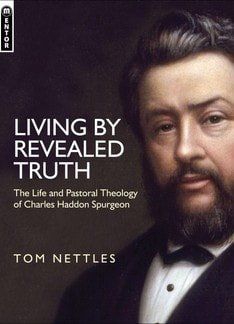Living by revealed truth: the life and pastoral theology of Charles Haddon Spurgeon
Tom Nettles
Christian Focus
700 pages, £29.99
ISBN: 978-1-78191-122-8
This labour of love from the pen of Tom Nettles has at least three strengths. The first is the author’s evident sympathy with his subject.
He has genuine affection and deep appreciation, without slavish adoration. The work does not slide into hagiography, yet there is real warmth. Nettles assesses Spurgeon with real but not mindless approval, tracing his development as a man and minister.
The second is that Nettles allows Spurgeon to speak for himself. While the author’s personal perspectives do filter through, he is generally careful to allow Spurgeon’s own voice to be heard. The pages are littered with Spurgeon’s words, culled from sermons, books and articles.
Occasionally, there is more detail than necessary to provide the insight required, but, with necessary and usually judicious selection from primary sources, Spurgeon quickly begins to take shape as a complete and well integrated character. His clear thinking, sharp wit, firm conviction, deep sorrows, ardent desires and complete consecration are laid out for us to observe and — where legitimate and possible — imitate.
The third benefit lies in the arrangement of this study. Eighteen chapters give us the opportunity to consider Spurgeon from many angles.
The opening chapters are a fairly straightforward chronological tracing of the early years, bringing us quickly from Spurgeon’s birth in Kelvedon, through his conversion and progress as man and minister, to his bursting on to the London scene.
Here, Nettles changes tack and looks at Spurgeon’s life and labours more thematically. Some overlooked elements of Spurgeon’s history are given a fair hearing. Spurgeon is held before us as a preacher, theologian, evangelist, teacher, churchman, philanthropist and polemicist.
In this last regard, I appreciated seeing Spurgeon’s stand against theological liberalism portrayed with unembarrassed vigour, as Nettles nudges toward recommending a more fully confessional stance as a defence against and antidote to the watering down of principle and practice.
What comes out repeatedly is that Spurgeon was a man thoroughly and principally committed to the Word of God as the rule of all his knowing and doing. He was anchored to divine revelation as the only way to hold fast against floods of error and streams of temptation. Because of that, he was a man who exulted in the gospel and who sought to hold the first things as the first things and be governed by heavenly priorities.
In all this, Nettles clearly demonstrates that Spurgeon cannot be quite so easily claimed by much modern evangelicalism as some within it might wish. Taken as a complete package, the man resists most attempts to tie him down as our own. As Spurgeon did in life, so now off the page he compels decision.
There are points in this (already long!) book where it would have been profitable to have more developed analysis and assessment, and some more considered conclusions. There are also points at which the seams in Nettles’ research pull a little — the author’s voice is not as coherent as it might be, meaning that the thread of his argument is nearly lost.
There are also a few jarring phrases along the way and an unfortunate number of errors in the text. Some of these more minor concerns, it is hoped, can be quickly corrected in further printings.
The sheer size of this volume prevents its use as an introduction to Spurgeon. However, for those growing to appreciate the man and wanting to get a real handle on him, and who are eager for and able to digest a thorough review of his life, this is the place to go.
Next to Spurgeon’s own voluminous writings, I hope and imagine that this book will be recognised as a magnificent achievement in its own right, and will be viewed, for some time to come, as a definitive, full-length portrait of this servant of Christ — a man who lived, as all should, by revealed truth.
Jeremy Walker
Crawley




